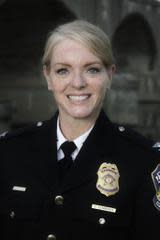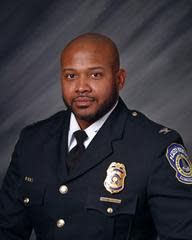New Indianapolis assistant police chiefs talk approaches to youth violence, mental health
New leaders are taking the helm at the Indianapolis Metropolitan Police Department after the appointment of Christopher Bailey as police chief.
The department recently announced two new assistant chiefs of police. Catherine Cummings and Michael Wolley, who were both deputy chiefs with the department, have been promoted to assistant chief positions.
In interviews Wednesday with Indystar, Cummings and Wolley answered questions about their backgrounds and goals for their new positions. The questions and the assistant chiefs’ responses have been edited for brevity and clarity.
More: IMPD's new Chief Christopher Bailey talks recruiting, technology and priorities in new Q&A
New assistant chief Cummings has focused on mental health issues in city previously

Cummings has been with IMPD for around 25 years, working in nearly every area of the police department.
She worked as a uniform officer, homicide detective, department spokesperson and supervised young officers in the East District. Cummings also helped develop the Behavioral Health Unit/Mobile Crisis Assistance Team (MCAT) programs.
Cummings is a board member for Mental Health America of Indiana, Mental Health America of Indianapolis, and was a member of a planning committee that worked to open the Assessment and Intervention Center located at the Community Justice Campus in Indianapolis.
She was the first woman appointed to major of the investigations division and served as a commander with the IMPD Training Academy. She was also the deputy chief of the training, policy and oversight division.
Cummings will oversee IMPD’s administrative functions, its training programs, community outreach, recruiting/retention efforts, and modernize its transparency processes in her new role.
What keeps you motivated, especially with the many challenges of a law enforcement job?:
Cummings: This is a challenging job. This is a hard job, but that doesn't change the fact that it's an important job. There are times where it's a fun job. It constantly keeps me fresh and, on my toes, and ensures that I'm looking to make sure we are doing best practices and improving.
I believe fully and completely in this job. We do need good, motivated people to continue to want to do this job. That's what keeps me going and I love Indianapolis. We have so many good people who live here and who deserve to live in a safe community.
What goals do you have in mind as you take on new position?
Cummings: As our new chief said last week, it's the job of everybody on the department to continue to drive down violent crime and to recruit new people to come into the agency and to retain the people we do have. Of course, those are my goals too.
My goal is to help our new chief with his modernization of our policies and our technology and the continued modernization of our training. I also want to increase transparency of the department. Part of my responsibilities will be developing two new areas structurally.
More: IMPD's new Chief Christopher Bailey talks recruiting, technology and priorities in new Q&A
One of those involves developing a formal strategic plan for the police department. It will help us to finalize and firm up our identity, so our officers feel that we are all working toward that same common goal, and they know what that goal is.
Another one of the new tasks that I've been given is to streamline and standardize our technology, data and transparency area. We will have to decide how all of that will look and how it can be modernized. We want to make it easier for the citizens to get the data requests they want, and they can know their police department hopefully at the push of a button.
Why is it important for someone with background work in mental health issues to be in your position at the department?
Cummings: Finally, as a society and as an agency, we are able to talk openly about mental health and mental health challenges. Unfortunately, a lot of people who are experiencing challenges with their mental health may not be connected with the proper resources they need.
We have finally come to that realization that a lot of runs are not necessarily public safety or violations of the law, but a lot of them are people struggling and need our help. We may not be the best resource, but a lot of times are the first resource.
We've worked very hard in the city to make more resources available and educate our officers as to what to look for to identify someone struggling with mental health. We are continuing to improve upon that and expand our resources and really open up those avenues for people who need help finding the right help.
More: City details new crisis response team for mental health calls – without police
We've done an awesome job training our officers and having an awareness of it and hopefully we are doing a better job in directing people away from the jail and away from the criminal justice system and into treatment and resources.
It's very much engrained in our agency already, but then me being in this position I'm just able to continue that progress for our agency and get the people in our community who are struggling the help they need.
Wolley worked on youth violence issues in the city before appointment to assistant chief

Wolley joined IMPD in 2006 and started as a patrol officer in the Northwest District, staying in that role until 2011.
He has also worked as a youth violence reduction team detective, community affairs officer and recruiter. Wolley was promoted to sergeant in 2006 in the North District then promoted to executive officer to the north district commander.
Indianapolis crime news 'A people person': Gary bartender, pub owner killed in shooting at Indy Waffle House
In 2018, Wolley was promoted to lieutenant overseeing the department’s public affairs office then he was named the North District commander. By 2021, Wolley attained the merit rank of captain. He took on the role of deputy chief of operations responsible for the oversight of the patrol and special operations division last year.
He also served as a member of the crisis negotiations unit for five years.
What keeps you motivated, especially with the many challenges of a law enforcement job?:
Wolley: This is where my heart is at. This job allows the intersection of my purpose and passion. What I mean by that is I feel like I belong here. Our mission is simple and that's providing safety for our citizens. With that, comes some challenges, but nothing that we can't overcome. I have a passion for people. It's a place where I feel at home and comfortable.
What goals do you have in mind as you take on the new position?
Wolley: Coming from the operations world, my focus was our officers had the equipment they needed and were pushing the mission forward to reduce crime. At the end of the day, there are just some fundamental must-do things. We've got to figure out a way to continue reducing crime, developing our workforce so we can supply the best services possible for our citizens, but also engaging our community and having conversations.
We do a really good job engaging the people that want to be engaged by us. The challenge I'd like to put out there is how can we get into those rooms where people may not be as receptive. That's where we really need to make lasting relationships.
As a former youth violence reduction team detective, what can the department do to reduce youth violence in the city?
Wolley: I think it's something that we all have to focus on, to include the community. There's no doubt about it that our teens and juveniles are becoming more and more active. We need to figure out creative ways of engaging them. We need to figure out in a hurry how we stop some of the conflict and violence that's going on.
More: Stories of rising Indy youth violence 'shock the conscience.' But not everyone has given up
I attribute a lot to just how large this world is but how social media makes it so small. When I was growing up, I didn't have the pressures of social media where anything I did could be put on display with a video. These kids are navigating a world where any mistake they make can be amplified. Any beef or conflict they have can be amplified.
It's really figuring out and partnering with entities that have that ability to provide some coping for these kids with the issues they are facing.
Contact Jake Allen at jake.allen@indystar.com. Follow him on Twitter @Jake_Allen19.
This article originally appeared on Indianapolis Star: Indianapolis police: IMPD's new leaders talk mental health, youth violence
